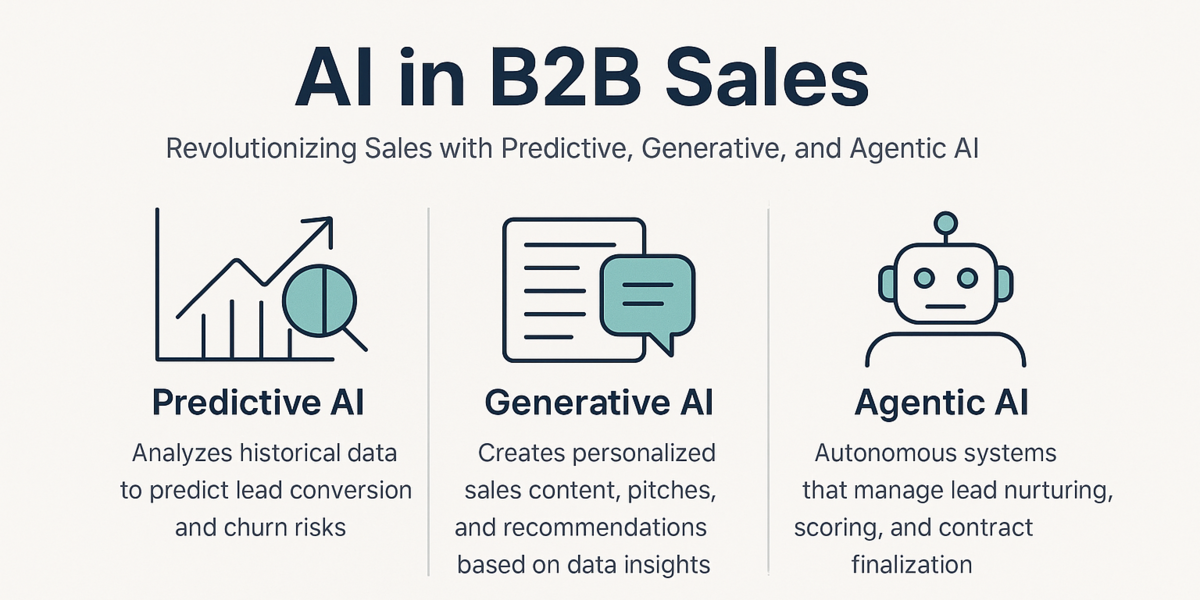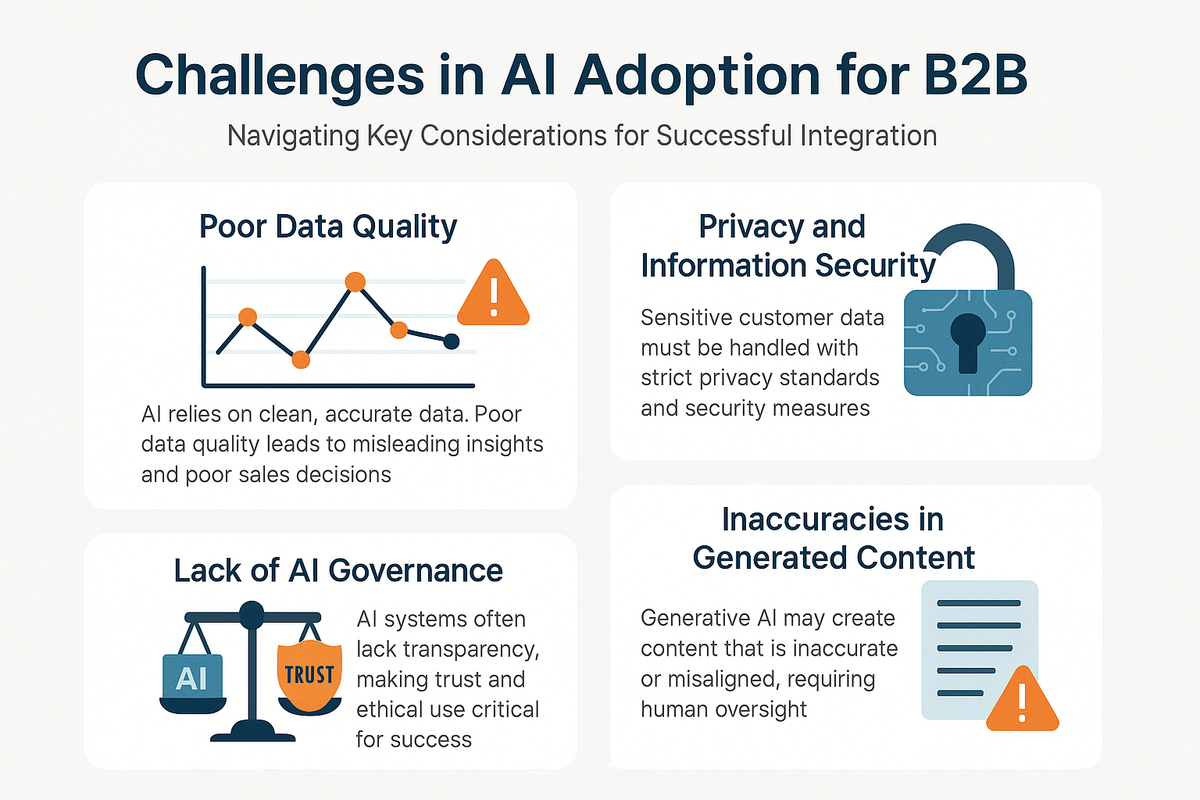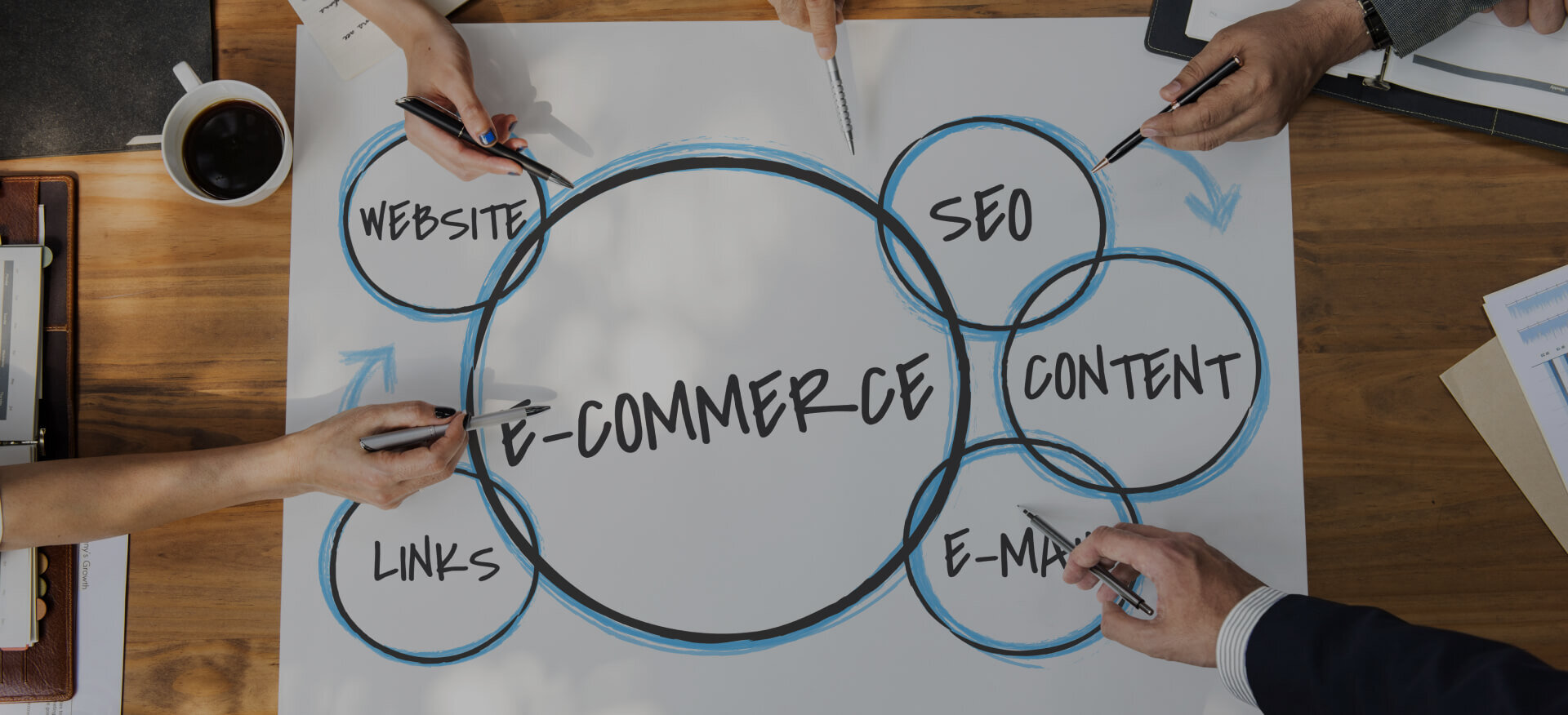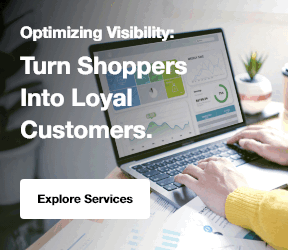Did you know that since 2025 started, AI in B2B sales is no longer a futuristic concept?
Yes, and that's fascinating. Isn’t it! It’s a reality reshaping how businesses connect with clients, streamline operations, and drive revenue.
With 87% of top-performing companies already using AI for sales to enhance their sales processes, according to recent industry insights, the technology is proving to be a game-changer.
From crafting personalized outreach to automating repetitive tasks, AI for sales empowers teams to focus on what matters most: building meaningful relationships and closing deals.
This blog explores how AI in sales and marketing is revolutionizing B2B strategies through personalization, predictive analytics, and process automation, offering practical steps to help your business stay competitive in an AI-driven world.
What is AI in B2B Sales?
AI in B2B sales leverages three primary technologies: predictive models, generative AI, and agentic AI. These technologies enable autonomous decision-making and the automation of various sales processes, transforming digital B2B sales. Additionally, integrating a B2C web development agency service into the sales strategy can bridge the gap between B2B and B2C dynamics, offering a comprehensive approach to customer engagement across both sectors.

Predictive AI
Powered by machine learning algorithms, predictive AI analyzes historical data to identify patterns and make forecasts, such as predicting which leads are most likely to convert or which clients are at risk of churning. For instance, by analyzing CRM data, AI for B2B sales might predict that deals between $500,000 and $1,000,000 close faster when clients request advanced customer support, allowing sales teams to focus on these high-priority opportunities.
Generative AI
Leveraging large language models (LLMs), generative AI for sales creates new content, recommendations, or workflows based on vast datasets. In B2B sales tech, this means AI can analyze client data and industry trends to generate personalized sales pitches tailored to specific client needs, offering variations for different stakeholders.
Agentic AI
Agentic AI refers to systems capable of making autonomous decisions and taking actions to achieve sales goals based on context and feedback. In B2B sales, using AI in B2B sales processes can result in virtual sales assistants that manage lead nurturing, scoring, and even contract finalization without human intervention, streamlining operations and boosting efficiency.
These AI-driven technologies are revolutionizing B2B sales, enabling smarter, data-driven decision-making and significantly enhancing sales outcomes in the digital B2B sales landscape.
Levels of AI Interaction in B2B Sales
AI in B2B sales operates through different interaction levels, from basic support to full independence. This progression helps teams adapt AI for B2B sales strategies based on account size and complexity.
- Augmented Selling: AI supplies sellers with tools like talking points, next-action suggestions, and automated cadences for email or social media, making outreach more systematic.
- Assisted Selling: AI works in real time during calls, providing prompts, drafting notes, and updating systems like CRM, so sellers handle customer focus while AI manages routine tasks.
- Autonomous Selling: AI handles full engagements, such as prioritizing leads, qualifying opportunities, and managing touchpoints across channels like voice or video, with minimal human input.
For large accounts, AI assists in planning and management, while in transactional sales, it runs independently to cover more ground. A 2025 survey of 400 US sales professionals shows 70% use AI for basic tasks, but only 20% reach assisted or autonomous levels, indicating room for growth in b2b sales ai adoption.
Explore Our B2B Marketing Services!
The Power of AI-Powered Personalization in B2B Sales
Today’s B2B buyers expect tailored experiences that mirror the personalization they encounter in B2C interactions.

A 2025 survey by McKinsey found that 71% of B2B decision-makers prefer consumer-like experiences, demanding content and outreach that align with their specific needs.
AI in B2B marketing makes this possible by analyzing vast datasets such as purchase history, website behavior, and firmographics to deliver hyper-personalized experiences at scale. Agencies like AI-powered search engine optimization agency for B2C platforms track intent signals, ensuring the right message reaches the right decision-maker at the optimal moment, creating a seamless experience that mirrors customer expectations in both B2B and B2C markets.
AI for sales and marketing enables businesses to segment audiences into granular groups, even down to individual accounts, and customize every touchpoint.
For example, AI can analyze a prospect’s browsing patterns to recommend relevant case studies or tailor email subject lines based on their industry.
Tools like AI-powered Account-Based Marketing (ABM) platforms track intent signals, ensuring the right message reaches the right decision-maker at the optimal moment.
Curious about other impactful strategies? Check out our post on what are five marketing strategies that retailers spend half of their annual budget on?
4 Benefits of AI Personalization
- Increased Engagement: Personalized content cuts through the noise, resonating with prospects and boosting interaction rates. Companies using AI in sales report up to 60% higher engagement due to tailored outreach.
- Higher Conversion Rates: When offers align with a prospect’s pain points, conversions soar. AI-driven campaigns often see 20-30% higher response rates compared to generic approaches.
- Enhanced Customer Loyalty: By delivering relevant touchpoints across websites, emails, and sales calls, AI in B2B sales builds trust, fostering long-term relationships.
- Improved ROI: Focusing resources on high-intent prospects reduces wasted spend, shortens sales cycles, and maximizes returns. Learn more about optimizing your marketing budget with the benefits of SEO.
Real-world applications include intelligent website content management systems that adapt homepage content based on a visitor’s industry or AI-powered sales tools that generate customized pitch decks. By leveraging generative AI in sales and marketing, businesses can create dynamic content that feels bespoke, setting them apart in a crowded market.
Predictive Analytics: Anticipating Buyer Behavior with AI
Imagine knowing which leads are most likely to convert or which clients are at risk of churning before it happens. AI in sales makes this possible through predictive analytics, using machine learning to analyze historical and real-time data for actionable insights. By using B2C SEO services to enhance website content and structure, businesses can improve how they predict and meet the needs of their B2B customers as well.
How Predictive Analytics Work in B2B?
By processing thousands of data points, such as engagement history, firmographics, and market trends, AI enables sales forecasts to predict buyer behavior accurately. Here’s how it transforms B2B sales:
- Lead Scoring: AI ranks leads based on their likelihood to convert, allowing sales teams to prioritize high-potential prospects. This reduces time spent on low-value leads and boosts win rates.
- Churn Prediction: AI in B2B marketing identifies at-risk clients by analyzing usage patterns or support ticket sentiment, enabling proactive retention strategies.
- Sales Forecasting: AI accounts for variables like seasonal trends and pipeline activity to deliver precise revenue predictions, improving planning accuracy.
- Next-Best Action Recommendations: AI suggests optimal actions, such as sending a tailored offer when a prospect shows buying signals, like frequent pricing page visits.
- Market Trend Analysis: By scanning external data like industry news or social media, AI predicts demand shifts, guiding product development and marketing strategies.
For instance, a B2B software company might use sales automation AI to identify a lead with an 80% chance of converting, prompting the sales team to send a personalized demo invite.
This data-driven approach enhances efficiency and ensures timely outreach. To dive deeper into optimizing your digital strategy, read this article on how to get into digital marketing to get the best results. What's The Impact?
Businesses using predictive analytics report 15-20% shorter sales cycles and up to 25% higher conversion rates. By removing guesswork, AI in sales and marketing empowers teams to act decisively, delivering the right solutions at the right time.
Streamlining Operations with Sales Automation AI
Repetitive tasks like data entry, follow-up emails, and lead qualification can drain sales teams’ productivity. In 2025, sales automation AI is transforming B2B operations by handling these tasks, freeing teams to focus on strategy and relationship-building.
6 Key Areas of AI Automation
- Lead Qualification: AI analyzes behavioral signals to score and prioritize leads, automatically routing high-potential ones to sales reps. This ensures no opportunity is missed.
- CRM Management: AI in B2B sales auto-logs interactions, calls, emails, meetings, eliminating manual data entry and keeping CRMs up-to-date.
- Email Campaigns: AI optimizes email send times, personalizes content, and adjusts outreach frequency based on engagement, boosting open rates by up to 30%.
- Chatbots: AI-powered chatbots handle initial inquiries, qualify leads, and schedule meetings 24/7, improving response times and customer satisfaction. Learn about effective calls-to-action in what is CTA to collect more clicks on the website.
- Sales Insights: AI analyzes call transcripts to identify trends, such as competitor mentions or customer sentiment, enabling reps to act swiftly.
- Reporting: AI generates real-time performance reports, highlighting campaign successes and anomalies without manual number crunching.
Why It Matters?
Automation saves time and ensures consistency. A 2025 Salesforce report found that businesses using AI for sales and marketing saw a 40% productivity boost, with sales cycles shortened by 15%.
By automating routine tasks, teams can focus on high-value activities like closing deals and nurturing relationships.
Specialized AI Agents in Operations
To push automation further, AI in B2B uses specialized agents that connect across systems for better context.
These include:
- Orchestration agents that split goals into tasks and coordinate teams.
- Lead generation agents that score leads from data sources.
- Qualification agents that map buyers and estimate ROI.
- Deal conversion agents that handle proposals and pricing.
- Customer success agents that monitor usage and spot expansion chances.
In ai b2b marketing, these agents balance autonomy with oversight, handling small deals alone while supporting humans on big ones. A case study from a tech firm shows 30% more coverage in long-tail accounts after adding such agents
Top 5 AI Use Cases in B2B Sales
AI in B2B sales is revolutionizing how businesses approach customer acquisition and relationship management. By integrating AI technologies into sales processes, companies are able to enhance efficiency, streamline operations, and drive better results. Here are some of the top AI use cases:
1. Autonomous Prospecting
Using AI in B2B sales allows businesses to autonomously identify and engage with high-potential leads. AI systems analyze historical data and external signals to pinpoint prospects who are most likely to convert. This reduces the time spent prospecting, allowing sales teams to focus on closing deals rather than searching for new leads.
2. Lead Qualification and Scoring
AI for B2B sales enhances lead qualification by automatically scoring leads based on their likelihood to convert. B2B AI tools analyze data from multiple sources, such as CRM systems, email interactions, and social signals, to prioritize leads. This ensures sales teams focus their efforts on high-value prospects, improving overall efficiency and conversion rates.
3. Pipeline Analysis
In digital B2B sales, AI plays a crucial role in optimizing sales pipelines. By analyzing the stages where leads are getting stuck, AI tools can recommend actions to move them forward. AI also automates re-engagement campaigns, ensuring that leads continue progressing through the funnel, which enhances pipeline velocity and conversion rates.
4. Email Generation
Generative AI in sales tools are becoming essential in automating personalized email outreach. Using CRM data, AI can create tailored email messages that speak to the specific needs of each lead or client. This is a key use of B2B sales tech, saving time for sales reps while increasing the relevance and impact of communications.
5. Sales Forecasting
AI in B2B ecommerce and sales environments enables businesses to forecast sales with greater accuracy. By analyzing historical sales data, current market trends, and real-time data, AI provides predictive insights that help sales teams allocate resources more effectively, plan sales strategies, and set achievable targets.
Explore Our B2B Web Design & Development Services!
4 Challenges and Considerations in AI Adoption for B2B Sales
While AI offers powerful advantages, its adoption in B2B sales does come with some hurdles. Companies need to be mindful of various factors when integrating AI into B2B sales processes:

1. Poor Data Quality
One of the key challenges in using AI for B2B sales is the reliance on accurate data. If the data used by AI models is incomplete, outdated, or incorrect, the insights generated can be misleading, leading to poor sales decisions. Clean and well-maintained data is essential to ensuring AI tools function optimally.
2. Privacy and Information Security
AI tools that handle sensitive customer and company data must adhere to strict privacy and security standards. This is particularly important when using AI in B2B ecommerce, where the handling of financial and personal data is highly regulated. It is essential to select AI solutions that comply with data protection laws and implement robust security measures.
3. Lack of AI Governance
Many AI systems in B2B sales function as "black-box" models, where their decision-making process is not always transparent. This lack of visibility can create trust issues, especially when making significant sales decisions. It’s important to have governance structures in place to ensure AI systems are used responsibly and ethically.
4. Inaccuracies in Generated Content
While generative AI offers benefits like email automation and content generation, it can sometimes create content that is inaccurate, biased, or misaligned with the brand. Human oversight is necessary to ensure that the content generated by AI is correct and appropriate for client interactions.
Over 80% of sellers report inaccuracies and data integration issues as barriers, often requiring manual checks that cut efficiency. Training gaps affect 75%, with sporadic sessions failing to build skills. Companies address this through steady pilots and hybrid build-buy models.
How To Choose the Right AI Tools for B2B Sales?
Selecting the right AI tools is critical for businesses looking to optimize their B2B sales process. It’s important to consider platforms that align with your sales goals, integrate well with existing systems, and provide strong security measures. Here are some key factors to consider when choosing AI solutions for your sales team:
1. Integration with Existing Systems
When adopting AI in B2B sales, it is essential that the AI tools integrate seamlessly with your CRM, sales platforms, and other software systems. This ensures smooth data flow across departments and maximizes the value of your sales tech.
2. Alignment with Sales Goals
Each business has unique sales objectives, and AI platforms should align with these goals. Whether you're aiming to improve lead qualification, boost pipeline velocity, or enhance sales forecasting, make sure the AI tools you choose are capable of supporting your specific AI for B2B sales strategies.
3. Security Features
Given the sensitive nature of the data in B2B sales, choosing AI tools that prioritize data security is critical. Ensure that the platform has robust security measures to protect client and company information, especially when using AI for B2B sales in areas like e-commerce or large-scale enterprise transactions.
For ai-powered b2b sales engagement, pick tools with feedback loops and clear data sources to maintain accuracy.
6 Practical Steps to Adopt AI in B2B Sales
Integrating AI in B2B sales may seem complex, but a structured approach makes it achievable. Here’s how to get started:
1. Build AI Awareness
Educate your team on AI for sales through workshops or tool demos. Highlight how AI enhances, not replaces, their work. Fostering a culture open to innovation encourages adoption. Interested in learning more about AI? You can check out how to learn AI is transforming the world.
2. Audit Your Data
AI thrives on quality data. Ensure your CRM, marketing platforms, and support systems are integrated and free of duplicates. Clean, unified data fuels accurate AI insights. For data-driven marketing, explore best SEO reporting tools to audit or check your webisite performance.
3. Start with a Pilot
Test AI in sales with a single use case, like lead scoring or chatbot deployment. Set measurable goals, such as reducing response times by 40%. A successful pilot builds confidence for broader adoption.
4. Choose the Right Tools
Select AI tools that align with your needs and budget. Platforms like Salesforce Einstein or HubSpot offer robust AI for sales and marketing features, while specialized startups provide niche solutions. Involve your team in trials to ensure a good fit.
5. Measure and Scale
Track pilot performance against goals, gathering team feedback to refine the approach. Once proven, expand AI to other areas like predictive analytics or content automation. Regularly review AI systems to ensure alignment with business objectives. For more on scaling strategies, read marketing tactics.
6. Ethical Considerations
Maintain transparency with AI in B2B marketing by complying with privacy laws and informing customers about bot interactions. Combine AI’s efficiency with human creativity for optimal results.
Set a clear target with KPIs like conversion boosts, sequence deployments based on quick wins, integrate tech stacks for data flow, set governance for compliance, and commit 70% effort to people through training and incentives.
FAQs: AI in B2B Sales
Will AI take over B2B sales?
AI will not fully replace B2B sales but is transforming it by automating repetitive tasks and improving efficiency. Human skills like emotional intelligence, relationship-building, and complex decision-making remain essential.
For example, 72% of buyers feel AI outreach can seem robotic, proving the need for a human-AI balance.
What is the future of AI in B2B marketing?
AI will be a core driver of B2B marketing growth. It will power personalization, predictive analytics, campaign automation, and customer engagement through chatbots and content creation. Emerging trends include integration with IoT, voice search, and augmented reality. Success depends on strong data strategies and ethical use.
Can I use AI for sales?
Yes, AI can support sales by automating tasks like data entry, scheduling, and lead qualification. It also boosts forecasting accuracy and improves personalized outreach. Companies report reduced pipeline variance (from 40% to 5%) and a 35% increase in sales-qualified leads with AI.
Which AI tool is best for sales?
The best AI tool depends on your needs, but top options in 2025 include:
- HubSpot’s Breeze Intelligence: Strong in lead qualification.
- Salesforce Einstein: CRM integration and predictive analytics.
- Gong.io: Conversational intelligence and sales training.
- 6sense Revenue AI: Best for account-based marketing and lead generation
How Does AI Improve Lead Scoring In B2B Sales?
AI in B2B sales uses predictive analytics and machine learning to score leads based on their likelihood to convert. By analyzing historical and real-time data, AI ranks leads in order of priority, ensuring that your sales team focuses on high-value prospects. This reduces time spent on low-value leads, enhancing your overall conversion rates.
What Are The Benefits of Using AI in B2B E-commerce?
Using AI in B2B ecommerce brings several advantages, including better customer segmentation, personalized content, and predictive analytics for demand forecasting. B2B AI tools can help optimize pricing strategies, streamline inventory management, and automate customer service, improving the overall shopping experience for B2B buyers.
The Final Verdict
AI in B2B sales is transforming how businesses operate, offering unmatched personalization, predictive insights, and automation.
Companies leveraging generative AI for sales and other AI tools are seeing higher engagement, faster sales cycles, and stronger customer relationships.
By adopting AI in sales and marketing, businesses can stay agile, customer-focused, and competitive in a rapidly evolving market.
Ready to harness AI for sales? Start small, choose the right tools, and empower your team to embrace this technology.









